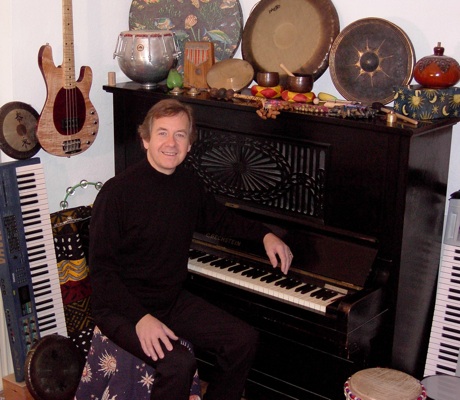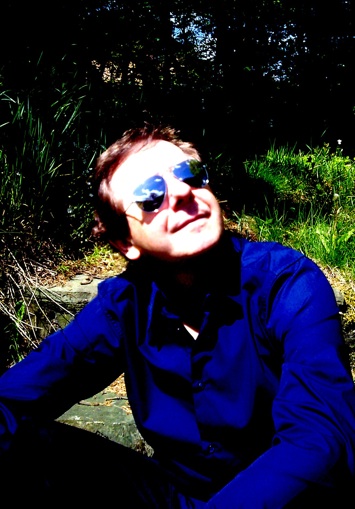German composer Bernward Koch recently launched
Gentle Spirit, a beautiful piano-based album and his fourth release on the Real Music label. With an extensive background in classical music and jazz, Koch brings a broad range of experience to his music that enables him to express anything he wants in the universal language of music. I think you’ll enjoy getting to know the man behind the soothing music!
KP: Congratulations on your latest Real Music release, Gentle Spirit! How is the album doing?
Koch: Thank you! The GENTLE SPIRIT album is doing very well thus far. I have the feeling that I’m gaining more and more attentive listeners.
KP: That’s good to hear! The piano is your primary instrument, but you started piano lessons fairly late (at age 15). Which instruments did you start with, and do you still play any of them?
Koch: First, I started with French horn at age 12 in our village marching band, but after a couple of months I changed to the trumpet because I wanted to play more melodies. At 14, I started as autodidact with drums, bass guitar and guitar. When I heard music like Jimi Hendrix’s version of Chuck Berry's "Johnny B. Good," I would try to play it day after day.
KP: By “autodidact,” do you mean that you were teaching yourself these songs by ear rather than from the sheet music or chord charts?
Koch: Yes indeed! When I was 15, my father bought me an old Bechstein piano, YOC 1923, a fine step forward. Today I play acoustic guitar (for composing, too), bass guitar and percussion in addition to my main instruments, piano and keyboards.
KP: What kind of piano training have you had?
Koch: First, I had lessons with the local piano teacher. Later, I studied with a Japanese Professor, and then at the Conservatory in Cologne. I always had classical piano lessons, but right from the start, I began to improvise just for me. I also attended different jazz-rock training courses with international jazz musicians. At that time, I heard many jazz musicians like John Coltrane’s quartet, Weather Report, Miles Davis, Oregon and Jan Garbarek, but I became a big fan of The Grateful Dead, Kraan, Pink Floyd, The Beatles, Kraftwerk and many other bands, too. I studied all of their recordings, and I'm actually an ear musician.
KP: Are you able to play by reading music as well as by ear? I have found that many musicians who can play “by ear” lose their ability to read music very well simply because they don’t have to.
Koch: Yes, you've got a point there, but for me and my music, the fastest way is without notes but directly from ear to the instrument.
KP: How has the economy affected the sales of your music? Is the situation as bad in Germany as it is here in the US?
Koch: It's probably similar here, but I don’t think it’s as bad as in the US. I guess right now people need music. Music can be a source for power, new ideas and energy.
KP: It’s also a very pleasant, safe, and constructive “escape” whether you are playing music or just listening to it. I’ve noticed that on most of your albums your wife, Christiane Boehm, plays flute and your younger brother, Christoph, plays percussion. Have you and your brother always played music together?
Koch: Christoph and I have played music together since childhood, so our musical interaction is very well-practiced.
KP: Was music one of the catalysts that brought you and your wife together?
Koch: Christiane and I met in a music school as students. She is a classically trained flutist. It's very interesting and always an inspiration for both of us to bandy, hear and love our musical worlds. Our two children have grown up with many kinds of music, and they play both guitar and piano.
KP: Do you do much live performing? If so, are your concerts usually solo piano or do you have other musicians with you to create a sound that’s closer to your recorded sound?
Koch: I enjoy performing live very much, and always welcome opportunities for improvisation. I normally perform with other musicians to get closer to the sound of my recordings, but during the show I play solo piano pieces, too, often as a passage to the next piece, freely improvising. I usually perform as a quartet with myself on piano and keyboards; my wife, Christiane, plays the flute, piccolo and percussion; my brother, Christoph, plays percussion and acoustic guitar (mainly twelve steel-string); and Nina Struve, who sings and also plays guitar, bass guitar and percussion. It's good to sometimes work with vocals on the stage, too.
KP: Is this usually wordless vocals or do some of your pieces have lyrics?
Koch: Songs with lyrics - English-language. The words are by Nina and me, previously undisclosed on records.
KP: From other interviews I have read, it sounds like some of your pre-Real Music recordings were much more rhythmic and had more jazz elements. Did you have to change your approach to your music to fit Real’s parameters or was it a natural evolution for you?
Koch: A good question. ;) Well, music for me is without constraints, but I never changed my approach to fit a special “Real Music sound.” The albums that I have released on the Real Music label are my music and my style, from my first record
FLOWING through
GENTLE SPIRIT which came out earlier this year.
STILL MAGIC and
PICANTE have a little more rhythmic sound, and both of those are on the BSC Music label (
bscmusic.com).
GENTLE SPIRIT is a little more rhythmic than
WALKING THROUGH CLOUDS and both of those are on Real Music.
KP: Some of the passages on Gentle Spirit remind me of Kevin Kern. Are you often compared to him since you are both pianists and both on the Real Music label?
Koch: I know that many of Kevin’s fans enjoy my music too. Maybe we have a similar method of composing, but similarities in style are by pure chance. We are both Beatles fans too, so maybe that has an influence! ;)
KP: It seems like Real Music is looking for a very consistent sound in their releases. They are always extremely high quality recordings, but do you ever find that consistency restricting or inhibiting?
Koch: No, I think having a consistent sound, quality and image are all very important to maintaining and enjoying a good reputation. Terence Yallop is a very good producer.
KP: Do you ever let loose and play heavy rock or jazz or is most of your music soft-spoken and mellow these days?
Koch: I have played a wide variety of styles in my life, so I can "let loose" not only in heavy rock or jazz, but in my own music too. On stage, I can get the highest flow when the interaction between musicians is at the top level. On all of my albums there are tracks where I let loose.
KP: Quite a few of the pianist/composers that I know have found that most of their recording sales are now in Asia - especially in Korea. Have you found this to be true as well?
Koch: I get a lot of airplay at radio stations and on TV. Especially in Japan, recording sales are not bad. In Korea, I have many fans of my record MONTAGNOLA , which was dedicated to Hermann Hesse. It's very interesting to experience that people from another culture understand you so well through the "real international language" of music.
KP: Have you found that your digital sales surpass the physical CD sales now?
Koch: Not yet, but I think someday they will. I don’t think the physical CD will die very easily, though.
KP: In your interview with Stephen Cairns at Piano Heaven (
link), you discussed your solo piano release
Montagnola at length, and yet I haven’t been able to find it. Was it released in the US? I think the MP3 download is on Amazon, but not the CD. It sounds like an intriguing album.
Koch: Well,
MONTAGNOLA - Dedicated to (the writer)
Hermann Hesse, was released by the Erdenklang/DA-Music label, as were my first records,
FLOWING and
LAGUNA DE LA VERA. Yes, you can purchase the album as a download on iTunes, and worldwide as a CD from
erdenklang.de. I hope someday we will release it officially in the US, too.
MONTAGNOLA is a completely improvisational solo piano album, recorded in a silent room on a Yamaha grand piano. It’s in a very special mood and a melodic-meditation style in my handwriting. While I was playing and recording, I could look out the window and "play" immediately what I saw, such as snow coming from the mountains. Music and nature are one for me.
KP: What are you working on now? Besides this interview! =)
Koch: My current release
GENTLE SPIRIT (
realmusic.com) is in the center. I’m still working on promoting it here in Germany to get more media attention. We don’t have so many radio stations here for instrumental music, but we definitely have an audience for this music.
KP: Traditionally, Europeans have been much more supportive of their artists than Americans. Do you think this is still true?
Koch: Oh, actually no, I guess it's rather the opposite. Classical (and jazz) musicians might have more support, but there is hardly any in my style of music.
KP: How do you describe your music to people who aren’t familiar with it?
Koch: Okay, the following descriptions are from fans: "your music is ... reassuring, calming, for dreaming, music with eternal melodies, to breathe deeply, relaxation..."
KP: Is there anything else you’d like to talk about?
Koch: Thank you to all my fans in the world, as well to Steinberg Cubase, Native Instruments and Sonor percussion, which I work with in the studio. For me music means telling stories.
Many thanks to Bernward Koch for taking the time to chat with us! For more information about Bernward, visit
his website,
realmusic.com, iTunes, and Amazon. Also, check out his
Artist Page here on MainlyPiano.com
Kathy Parsons
September 2009


